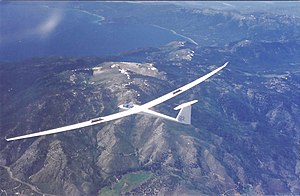Schleicher ASW 22
| ASW 22 | |
|---|---|
 Schleicher ASW22 flying in wave out of Minden NV | |
| General information | |
| Type | Open-class sailplane |
| National origin | Germany |
| Manufacturer | Schleicher |
| Designer | |
| Number built | 87 |
| History | |
| First flight | 8 July 1981 |
The ASW 22 is an Open Class glider built by Alexander Schleicher GmbH & Co which first flew in 1981. The 'W' in the designation indicates that this is a product of the German designer Gerhard Waibel. An ASW 22 broke the world 750 km triangle speed record in 1985 and ASW 22s have won first place in six World Gliding Championships.
Design
[edit]The ASW 22 is the successor to the ASW 17. It first flew as a 22-metre glider. The span was later increased to 25 metres for the ASW 22B with a modified inner wing section and flaperons similar to the ASW 20. It uses a Horstmann and Quast wing profile on the inner section with underwing tubes to collect high-pressure air which is then expelled through turbulator holes in the bottom wing skin ahead of the flap and aileron hinge line to prevent the separation of the laminar flow. The ASW 22 has a two-wheel retractable undercarriage.
Variants
[edit]
- ASW 22
- Open Class high-performance sailplane; 22 or 24 metre span
- ASW 22M
- First motorized self-launching version with 22/24 m span, Rotax 505A engine
- AS 22-2
- The prototype of the ASH 25, which combined the wing of the ASW 22 with a two-seat fuselage[1]
- ASW 22B
- Span increased to 25 m
- ASW 22BL
- Fitted with 26.4 m tips
- ASW 22BE, BLE
- self-launching versions with 49 hp Rotax 505A engine
- ASW 22BLE 50R
- self-launching version with 50 hp rotary engine
- ASW 22DB
- ETA biter A response to the Eta, from Gerhard Waibel and Dick Butler, derived from the ASW 22BL.[2]
Specifications (ASW 22BL)
[edit]
Data from Jane's All the World's Aircraft 1988-89.[3]
General characteristics
- Crew: 1
- Length: 8.1 m (26 ft 7 in)
- Wingspan: 26.58 m (87 ft 2 in)
- Height: 1.66 m (5 ft 5 in)
- Wing area: 16.7 m2 (180 sq ft)
- Aspect ratio: 38.3
- Airfoil: root:DFVLR HQ17-14.28; tip:Delft university DU84-132
- Empty weight: 465 kg (1,025 lb)
- Max takeoff weight: 850 kg (1,874 lb)
- Water ballast: 235 L (62 US gal; 52 imp gal)
Performance
- Stall speed: 65 km/h (40 mph, 35 kn)
- Never exceed speed: 280 km/h (170 mph, 150 kn)
- g limits: +5.3 -2.65
- Maximum glide ratio: 62 at 95 km/h (51 kn; 59 mph)
- Rate of sink: 0.41 m/s (81 ft/min) at 67 km/h (36 kn; 42 mph)
- Wing loading: 33.4 kg/m2 (6.8 lb/sq ft)
See also
[edit]Related development
Aircraft of comparable role, configuration, and era
Related lists
References
[edit]- ^ "Specification ASH 25 / ASH 25 Mi" (PDF). Alexander Schleicher GmbH & Co. Segelflugzeugbau. July 2003. p. 2. Retrieved 1 February 2015.
The ASH 25, being the series production version of the AS 22-2
- ^ Butler, Dick (22 February 2012). "The "Eta Biter": Dick Butler's ASW-22DB". Retrieved 23 May 2014.
- ^ John W.R. Taylor, ed. (1988). Jane's All the World's Aircraft 1988-89. London: Jane's Information Group. p. 630. ISBN 0-7106-0867-5.
Further reading
[edit]- "Specification ASW 22 BL / BLE (english)" (PDF). Alexander Schleicher GmbH & Co. Segelflugzeugbau. July 2003. Retrieved 4 August 2014.
- Milgram, Fred Thomas; Judah; translator; contributor (1999). Fundamentals of sailplane design (3rd ed.). College Park, MD: College Park Press. ISBN 978-0966955309.
{{cite book}}:|last2=has generic name (help)CS1 maint: multiple names: authors list (link) - Simons, Martin (2005). Sailplanes 1965-2000 (2nd revised ed.). Königswinter: EQIP Werbung und Verlag G.m.b.H. ISBN 978-3-9808838-1-8.
